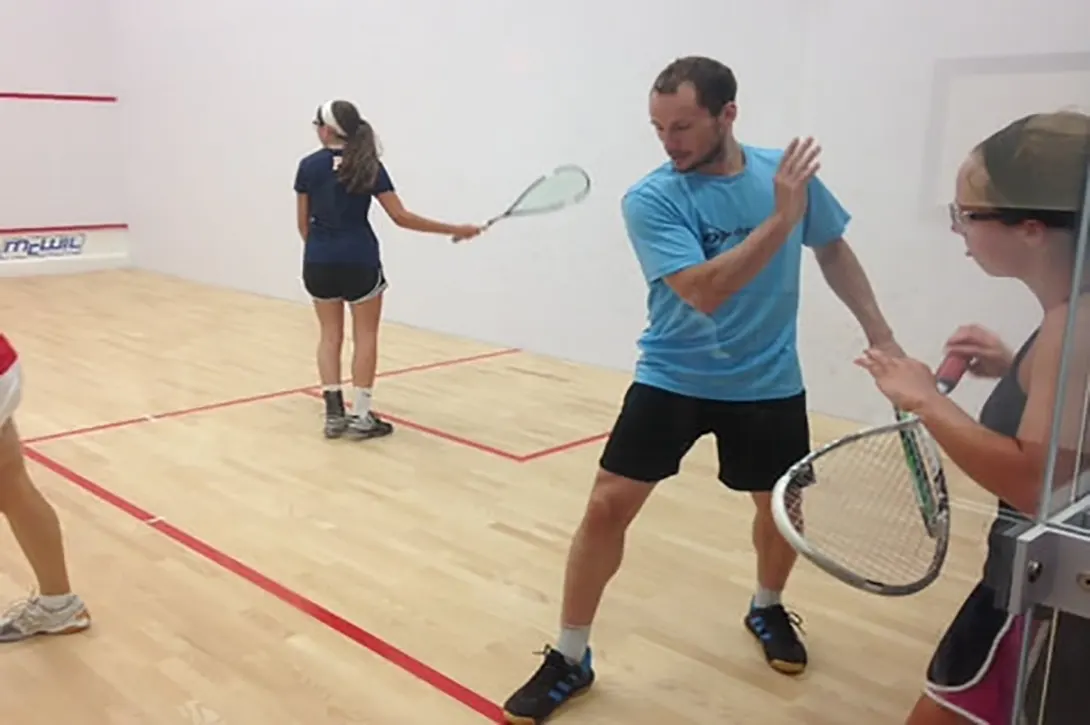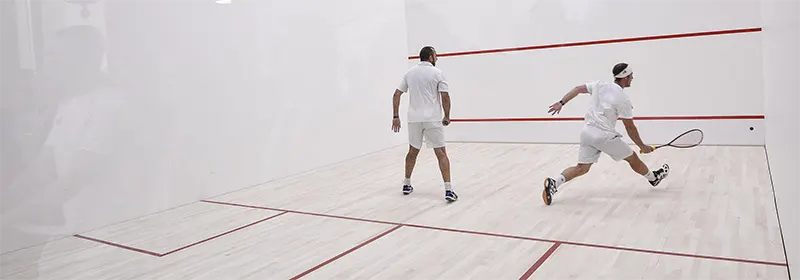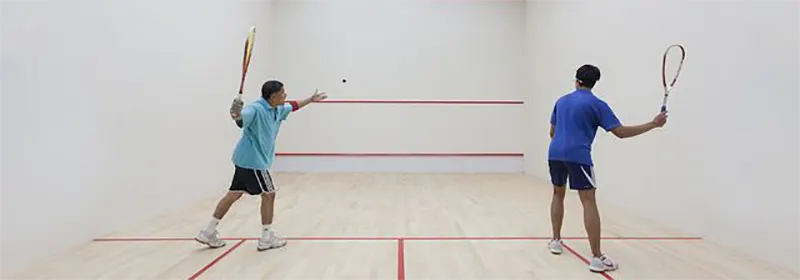30 July 2022 / 3-Min Read / Translate
Knowing what to expect when you have coaching can improve the process. A lot depends on your objectives for getting coaching and how much you commit to the process, but in general these points are valid for everybody.

Players receiving coaching from Gregory Gaultier.
It’s also worth noting that the points I talk about are true for squash coaching, tennis coaching, badminton coaching and table tennis coaching – actually, it’s probably true of ALL sports coaching!
There are lots of armchair coaches, who are quick to point out what you should be doing. You only need to visit Reddit to see players giving their opinion on what players should do. The reality is that going from your current swing (for example) to a better swing is a process. It’s not a smooth jump from one to the other. It’s not just a switch that can be flipped and suddenly you have a great swing! Many times there are intermediate steps that need to be passed through first. Bad habits that need to be replaced by better ones.
It’s during these times that you may play worse squash. Your accuracy and power may drop. It may take a few weeks until the change really feels comfortable. It’s not true for everybody, but when it comes to swing technique there is definitely a period of adjustment. That’s why I mention “commit” in the first paragraph.
Of course, coaching is not just about big changes to your swing, and the most effective change might be to do with shot selection or something simple.
That might sound obvious at higher levels of play. For example, a coach of a professional player almost certainly wouldn’t beat that player or else they would still be a pro! They could have been better when they were younger, but that’s a slightly different situation. At lower levels, it’s less clear and too often I have heard amateur players say that they wouldn’t visit a particular coach because they can beat them. I do partially understand their viewpoint, but it misses the fundamental aspect of what a coach does: They observe and help you improve.
Just because somebody was a great player doesn’t mean they can coach. Coaching is about communication and many other aspects not directly related to performance.

I bet these two players have had coaching.
This is aimed at men and follows on from the previous point. I have encountered too many men who have said that just because a coach is a woman they wouldn’t go to her. It’s a terrible attitude to have. We should be open to learning from whoever can help us. This approach is more common among club players and plenty of men beginners will happily learn from female coaches, but as they get better some of those men develop the idea that because they are faster, stronger and maybe better than the women coaches, they can’t learn anything from them. It’s total rubbish! Please don’r be one of those men.
Be prepared to learn from whoever can help you: young, old, man, woman – it doesn’t matter!
Don’t go to a coach and think that they will give you information and you will suddenly become club number one. It doesn’t work that way. Just like choosing a racket is a very personal thing, the same is true of finding the right coach. You need to be able to communicate with your coach. Explain how things feel, what works and what doesn’t work. Of course, the coach can see your improvement and see what doesn’t work, but it’s a faster and better process when there is more communication between you and them.
Many times I remember being on court and working with pupils who said almost nothing to me. I tried to get them to interact, but I wasn’t always successful. I did notice that those people didn’t come back or didn’t have as many lessons. perhaps if they had told me their thoughts or how something felt I could have helped more. I suspect that they thought they would come to me, I would give them some amazing, insightful piece of information and suddenly they would improve, not realising they would have to work hard too.
The more you communicate with the coach, the better the interaction, the faster you improve!

A little coaching may help these two players
Getting better is about learning what you need to change and then spending time making that happen. Improvement comes through purposeful, dedicate practice. I’ve had a few pupils who have come to me for 6 weeks, once a week and not improved. Each week and would give them their “homework” and the following week I would ask them have they practiced. Some lied and said they had, others were honest and said they hadn’t had time. A few complained they weren’t improving as quickly as they had hoped.
As a coach, I found that frustrating. I accept and understand that people have limited free time, but you really can’t have coaching once a week and do nothing else and still expect to improve quickly! The players who improved the most and the fastest were the ones who committed to spending time outside of coaching to work on the things they needed to work on.
Most improvement comes from the time spent practising not from the actual coaching lesson.
The relationship with your coach is like any other. Some people work well together, some don’t. Nobody is at fault in cases like this. It’s just a mismatch. Although I hope you go fully committed to learn from a coach, don’t be afraid to say to yourself that you are not happy and move on. Please don’t ghost the coach, just say that your are not getting what you had hoped from the lessons. Perhaps a brief, but honest chat will help redirect the lessons and keep you happy. Perhaps it won’t.
I have had years-long , fruitful relationships with players and I have also had one-lesson pupils, who I never saw again. It happens and honestly, as long as they are getting better with another coach, that’s all that matters.
If you don’t feel comfortable with a coach, look for a new one.
The video below doesn’t not contain point number 1.